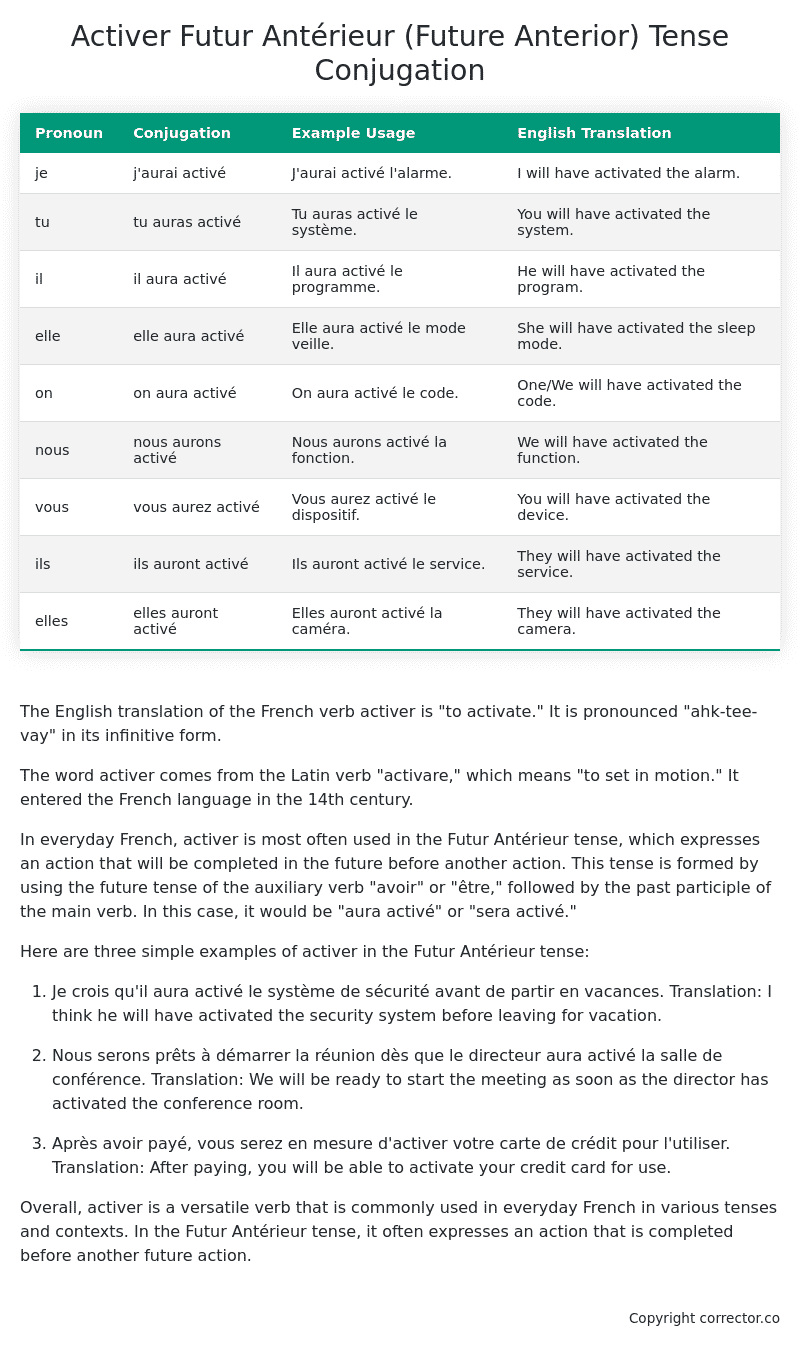Futur Antérieur (Future Anterior) Tense Conjugation of the French Verb activer
Introduction to the verb activer
The English translation of the French verb activer is “to activate.” It is pronounced “ahk-tee-vay” in its infinitive form.
The word activer comes from the Latin verb “activare,” which means “to set in motion.” It entered the French language in the 14th century.
In everyday French, activer is most often used in the Futur Antérieur tense, which expresses an action that will be completed in the future before another action. This tense is formed by using the future tense of the auxiliary verb “avoir” or “être,” followed by the past participle of the main verb. In this case, it would be “aura activé” or “sera activé.”
Here are three simple examples of activer in the Futur Antérieur tense:
-
Je crois qu’il aura activé le système de sécurité avant de partir en vacances.
Translation: I think he will have activated the security system before leaving for vacation. -
Nous serons prêts à démarrer la réunion dès que le directeur aura activé la salle de conférence.
Translation: We will be ready to start the meeting as soon as the director has activated the conference room. -
Après avoir payé, vous serez en mesure d’activer votre carte de crédit pour l’utiliser.
Translation: After paying, you will be able to activate your credit card for use.
Overall, activer is a versatile verb that is commonly used in everyday French in various tenses and contexts. In the Futur Antérieur tense, it often expresses an action that is completed before another future action.
Table of the Futur Antérieur (Future Anterior) Tense Conjugation of activer
| Pronoun | Conjugation | Example Usage | English Translation |
|---|---|---|---|
| je | j’aurai activé | J’aurai activé l’alarme. | I will have activated the alarm. |
| tu | tu auras activé | Tu auras activé le système. | You will have activated the system. |
| il | il aura activé | Il aura activé le programme. | He will have activated the program. |
| elle | elle aura activé | Elle aura activé le mode veille. | She will have activated the sleep mode. |
| on | on aura activé | On aura activé le code. | One/We will have activated the code. |
| nous | nous aurons activé | Nous aurons activé la fonction. | We will have activated the function. |
| vous | vous aurez activé | Vous aurez activé le dispositif. | You will have activated the device. |
| ils | ils auront activé | Ils auront activé le service. | They will have activated the service. |
| elles | elles auront activé | Elles auront activé la caméra. | They will have activated the camera. |
Other Conjugations for Activer.
Le Present (Present Tense) Conjugation of the French Verb activer
Imparfait (Imperfect) Tense Conjugation of the French Verb activer
Passé Simple (Simple Past) Tense Conjugation of the French Verb activer
Passé Composé (Present Perfect) Tense Conjugation of the French Verb activer
Futur Simple (Simple Future) Tense Conjugation of the French Verb activer
Futur Proche (Near Future) Tense Conjugation of the French Verb activer
Plus-que-parfait (Pluperfect) Tense Conjugation of the French Verb activer
Passé Antérieur (Past Anterior) Tense Conjugation of the French Verb activer
Futur Antérieur (Future Anterior) Tense Conjugation of the French Verb activer (this article)
Subjonctif Présent (Subjunctive Present) Tense Conjugation of the French Verb activer
Subjonctif Passé (Subjunctive Past) Tense Conjugation of the French Verb activer
Subjonctif Imparfait (Subjunctive Imperfect) Tense Conjugation of the French Verb activer
Subjonctif Plus-que-parfait (Subjunctive Pluperfect) Tense Conjugation of the French Verb activer
Conditionnel Présent (Conditional Present) Tense Conjugation of the French Verb activer
Conditionnel Passé (Conditional Past) Tense Conjugation of the French Verb activer
L’impératif Présent (Imperative Present) Tense Conjugation of the French Verb activer
L’infinitif Présent (Infinitive Present) Tense Conjugation of the French Verb activer
Struggling with French verbs or the language in general? Why not use our free French Grammar Checker – no registration required!
Get a FREE Download Study Sheet of this Conjugation 🔥
Simply right click the image below, click “save image” and get your free reference for the activer Futur Antérieur tense conjugation!

Activer – About the French Futur Antérieur (Future Anterior) Tense
Construction
Common Everyday Usage Patterns
Interactions with Other Tenses
For example
Summary
I hope you enjoyed this article on the verb activer. Still in a learning mood? Check out another TOTALLY random French verb conjugation!


